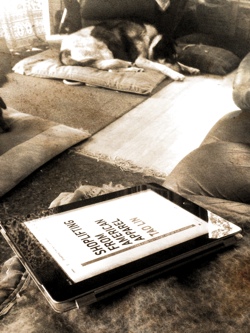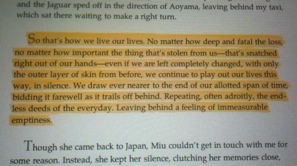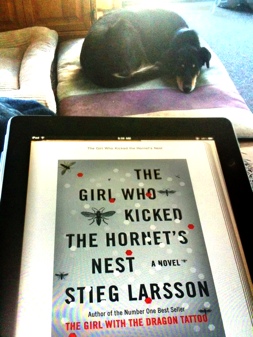
Tallys and Caslon
If it isn't obvious by now, I'm currently working on reading the rest of Haruki Murakami’s novels. I started with Wind Up Bird Chronicle in April 2008, and have only two left at this point. After finishing A Wild Sheep Chase it appears that there is some benefit in reading them in order, as this book and Dance Dance Dance share a few characters and locations. But the plots aren’t connected, so it probably doesn’t matter.
A Wild Sheep Chase is Murakami’s third novel, but is the first that is easily available in an English translation. Like the others, it slowly works it’s magic so that by the time strange things start happening, it seems normal. And the usual Murakami themes (solitude, cats, isolation in nature, etc.) are in evidence. But the whole thing doesn’t quite come together as well as in later novels.
Still, it is a very enjoyable book, and it’s fun to spend time in the strange worlds of Murakami’s characters. South of the Border, West of the Sun is next, and then After Dark. I should have no trouble finishing them in time for the English release of 1Q84.
Shoplifting from American Apparel is part of Melville House Publishing’s “Contemporary Novellas” series. I believe the point of the series is to provide a place for writers to publish short works, longer than what would fit into the usual short fiction outlets. The novella is a complelling format: long enough that the author can stretch out a little and expand on the characters, but short enough to read in a sitting or two. That’s a nice change of pace in between big, complicated books.
Tao Lin’s entry in the series is a collection of brief moments in the life of Sam, a writer who seems to drift around thinking about writing and interacting with whomever happens to be around in the backyards, bars and parties he attends. The writing is crisp and short, and there’s very little plot beyond Sam and where he goes. But at 112 printed pages, I wouldn’t expect a grand plot anyway.
There’s a lot of product placement in the novella, and I suspect that the commercialization of our lives is part of the point Lin is making. At one point Sam started thinking about what his life might be like if he were to really work hard on his writing:
Loneliness and depression would be defeated with a king-size bed, an expensive stereo system, a drum set, a bike, an unlimited supply of organic produce and coconuts, and maybe calmly playing an online role-playing game.
This idea doesn’t get very far, though, and the next scene is largely about the sound a “Synergy” brand kombucha makes when dropped on the ground. I think part of the message here is not that much really happens in real life, and we don’t really know what the moments are that are going to be really meaningful at the time they happen (either that or our lives are basically filled with moments that aren't meaningful).
Anyway, it was a fun read. I like the style and the way Sam moves through his world, but it makes me wonder how Lin would handle a longer format. I wouldn’t want to have read much more than the length of this book at least not without something actually happening.
Sputnik Sweetheart is a book about loneliness. There are three main characters, including the narrator who is in love with one of the women in the story. She is in love with the other woman in the story, who can no longer love at all after losing half of herself atop a ferris wheel in Switzerland. If that sounds strange, well, it’s Murakami.
It’s a short book, slow moving, but very captivating. Cats appear and disappear, and there’s even a dog or two. But loneliness is the primary emotion. This section reminds me of a Buffy episode where a girl actually does disappear because no one pays any attention to her:
But past a certain point nobody talked to me anymore. No one. Not my husband, my child, my friends . . . no one. Like there was nothing left in the world to talk about. Sometimes I feel like my body’s turning invisible, like you can see right through me.
Good book. Maybe not Murakami’s best, but very enjoyable.
The Girl Who Kicked the Hornet’s Nest is the third book in Stieg Larsson’s Millennium Trilogy. If you’ve read and enjoyed the previous two books, you will enjoy this one as well. Like the others, once you get into it, it is difficult to put the book down.
It’s not great literature, and there are hard to overlook flaws (anytime an interesting woman appears, there is a good chance the main character will eventually sleep with her), but it sure was fun to read. I’m looking forward to watching the movie.
This was the first book I read electronically, on an iPad and iPhone. I didn’t think I’d like this as much as I did, and will likely read a lot of books this way in the future. The only limiting factor for me is that most electronic books include Digital “Rights” Management (DRM) encryption, which means that it is a real hassle (and is probably even illegal in the U.S.) to convert these books into formats that can be read on different sorts of eBook readers. I don’t like the idea of buying something that I can only read on a particular device or software package because the support for that system could easily disappear in the future. Plus, if you buy books from multiple different sources, you have to have a different reader for each of them. For now, I will probably only purchase books using formats without DRM, or with DRM that is easily circumvented (like the Kindle format, for example).
I’ve had a Country Living Grain Mill for a couple years now, but without a motor, which meant grinding grains by hand. It’s certainly doable, but over time, I found that the time and effort it took to grind enough grain for a weeks worth of bread was becoming too much. As a result, I wasn’t making as many whole grain recipes.
They sell a variety of motorization kits, from the complete package (which is what I bought), to the parts you’d need to motorize it yourself with a separate motor.
The motor and kit I got is fantastic. It takes about fifteen minutes to grind enou wheat for a couple sandwich loaves, the flour doesn’t get overheated, and it grinds it very fine; equal to what you’d buy in the store.
Here’s the recipe I started this morning (makes two sandwich loaves) which comes from Peter Reinhart’s Artisan Breads Every Day:
Ingredients
- 250 g — Water (warmed to around 100°F)
- 283 g — Milk
- 1½ T — Yeast
- 284 g — White flour
- 550 g — Whole wheat flour
- 2 t — Salt
- 71 g — Honey
- 1 — Egg
- 56 g — oil
Directions
- Add water, milk, yeast, flour and honey to mixing bowl
- Mix egg and oil until blended, add to bowl
- Add yeast
- Mix with dough hook on medium speed for five minutes
- Rest, covered, for ten minutes
- Pull and fold dough twice, then rest ten minutes
- Repeat folding and resting three more times
- Refrigerate dough for one to four days in a covered, lightly oiled container
Baking
- Take dough out, let sit at room temperature for three hours
- Flatten dough into rectangle and roll into a loaf, put into greased loaf pan
- Let sit for two to three hours until dough has risen above the rim of the pan by around an inch
- Bake at 350°F for 40 minutes



